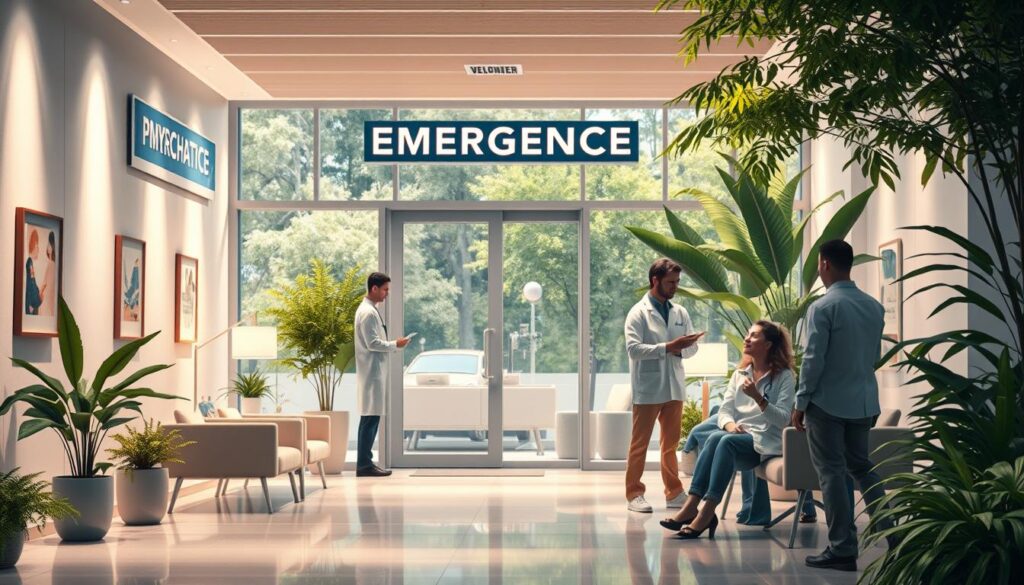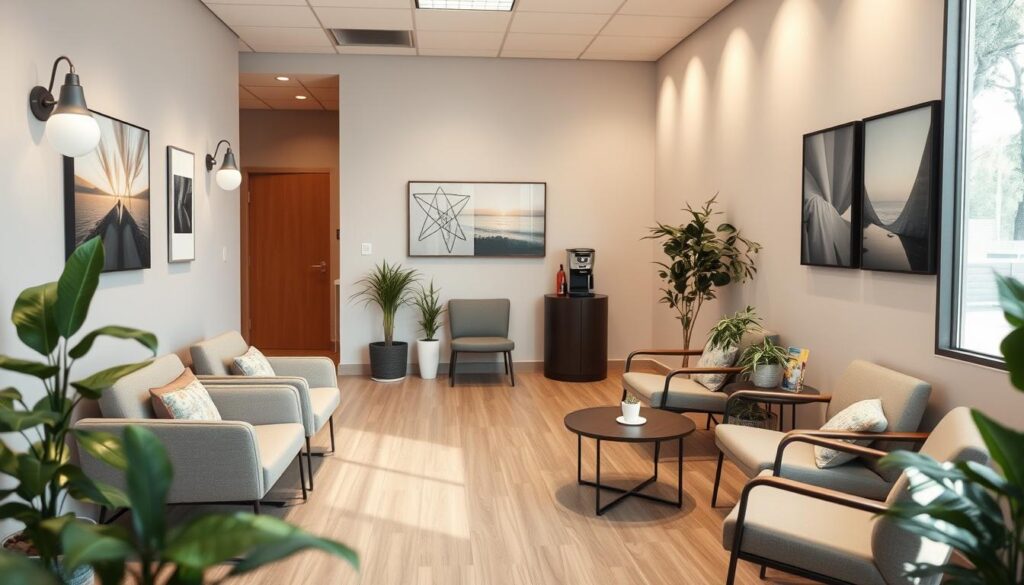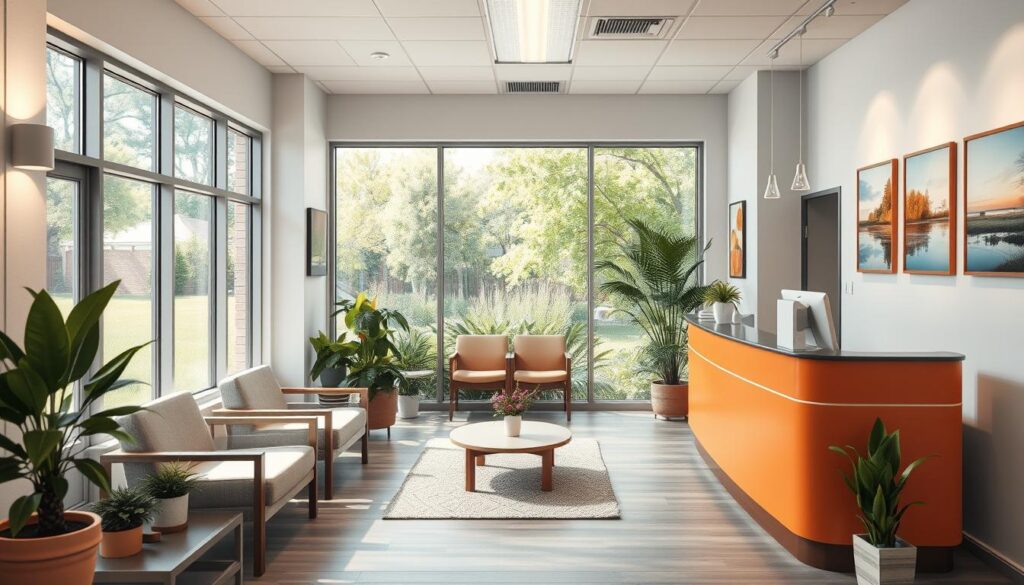When you’re facing a mental health crisis, you need help fast. Mental health urgent care centers are open 24/7. They offer crisis help to you or a loved one in need.
These centers are safe and caring. They help people who are feeling very stressed or upset. They are a better choice than going to the emergency room for some problems.
If you’re feeling down, anxious, or thinking about harming yourself, these centers can help. They have walk-in hours, online help, and programs in your community. This means you can get help when you need it most.
Key Takeaways
- Mental health urgent care centers offer 24/7 crisis intervention and support
- These facilities provide alternatives to emergency room care for non-life-threatening mental health crises
- Services include walk-in access, telehealth options, and community-based programs
- Specialized care is available for a range of mental health concerns, including depression, anxiety, and suicidal thoughts
- Urgent care centers aim to help individuals develop coping strategies and resilience during difficult times
Understanding Mental Health Crisis Services
When you face a mental health emergency, knowing where to turn is key. Crises can show up in many ways, like suicidal thoughts or severe anxiety. It’s very important to get help fast.
Types of Mental Health Emergencies
Mental health emergencies can look different for everyone. They might include:
- Suicidal thoughts or intentions
- Severe, uncontrollable anxiety or panic attacks
- Acute, disabling depression
- Psychosis, delusions, or hallucinations
- Thoughts of harming others
When to Seek Immediate Help
If you’re feeling any of these emergencies, get help right away. Call the 988 Suicide & Crisis Lifeline or go to your nearest psychiatric urgent care center or emergency room.
Available Support Options
There are many ways to get help during a mental health crisis. You can:
- Crisis hotlines like the 988 Suicide & Crisis Lifeline, which connect you with counselors and send mobile crisis teams when needed
- Walk-in mental health clinics and crisis stabilization units for quick help and support
- Mobile crisis teams that come to you and work with hospitals and law enforcement
- Inpatient psychiatric hospitalization for serious treatment and care
Remember, asking for help is brave, not weak. Don’t be afraid to reach out for the support you or your loved one needs.
24/7 Crisis Support and Hotlines
When you’re in a mental health crisis, help is always there. The 988 Suicide & Crisis Lifeline is ready to help 24/7. You can call, text, or chat for free and get help right away.
There are hotlines for different groups too. The BlackLine helps Black, Indigenous, and People of Color. The Friendship Line is for older adults and people with disabilities. The National Domestic Violence Hotline and the National Maternal Mental Health Hotline are here for you too.
These hotlines have experts ready to help. They can give psychological first aid and mental health crisis management advice. They can also find local help for you.
| Hotline | Number | Description |
|---|---|---|
| 988 Suicide & Crisis Lifeline | 988 | Free, confidential support for mental health crises |
| BlackLine | 1-800-604-5841 | Support for BIPOC individuals |
| Friendship Line | 1-800-971-0016 | Support for older adults and people with disabilities |
| National Domestic Violence Hotline | 1-800-799-7233 | Support for those experiencing domestic violence |
| National Maternal Mental Health Hotline | 1-833-943-5746 | Support for maternal mental health concerns |
Mental Health Urgent Care Services and Locations
If you’re in a mental health crisis, urgent care services can help. These places offer quick support and treatment. They are a kind alternative to the emergency room, giving care that fits your needs.
Walk-in Mental Health Centers
Walk-in mental health centers are great for urgent care during the day. They have teams of experts like therapists and psychiatrists. They can quickly help you and plan for your ongoing care.
These centers offer many services. You can get counseling, help with medicine, and find community resources.
Community Triage Centers
For help any time, community triage centers are open 24/7. The Southside Community Triage Center in Chicago is an example. It’s always ready to help you in crisis.
These centers do full evaluations, help in crisis, and stabilize you for a short time.
Living Room Programs
Living Room programs, like those in Chicago, offer a safe space. They are run by Healthcare Alternative Systems and Thresholds. Here, you can feel safe and work towards getting better.
| Service Type | Locations | Hours of Operation | Treatment Duration | Services Provided | Contact Information | Insurance Options |
|---|---|---|---|---|---|---|
| Walk-in Mental Health Centers | Multiple locations across the country | Monday to Friday, 9:00 AM to 8:00 PM Saturday, 9:00 AM to 5:00 PM |
Up to 30 days | Individual counseling, peer support, medication treatment, psychiatric consultation, skill-building groups, support groups, access to community resources, referral to follow-up services | Camden County: 856-254-3800 Cumberland and Salem County: 856-537-2310 |
Self-pay, third-party insurance, Medicaid, sliding scale fee based on income |
| Community Triage Centers | Southside Community Triage Center, Chicago | 24/7 walk-in services | Short-term stabilization | Comprehensive evaluations, crisis intervention, short-term stabilization | After-hours emergency: 856-428-HELP or 911 | Self-pay, third-party insurance, Medicaid, sliding scale fee based on income |
| Living Room Programs | Healthcare Alternative Systems, Thresholds, Chicago | Monday to Friday, 8:00 AM to 4:30 PM | Short-term crisis support | Comfortable, non-clinical environment for crisis support and assessment | Patients under 18 must have a parent or guardian present | Self-pay, third-party insurance, Medicaid, sliding scale fee based on income |
These urgent mental healthcare options are a good choice instead of the emergency room. They offer caring, specialized services during a crisis. By getting help here, you start on the path to feeling better and getting the help you need.
Emergency Response Systems for Mental Health
In mental health emergencies, having special emergency systems is key. These systems give quick help and connect people with the right resources. They help meet mental health needs.
The Crisis Intervention Trained (CIT) officer program is one such system. If you call 911 for a CIT officer, you get trained law enforcement. They know how to handle mental health crises well.
The Crisis, Assistance, Response, and Engagement (CARE) team in Chicago is another great example. It works weekdays, helping with mental health emergencies. The CARE team is a big help for those needing quick mental health help.
The Smart911 app is also useful. It lets users make a Safety Profile for first responders. You can add info about your mental health, meds, and doctors. This helps emergency teams give better care.
“Approximately 25% of all fatal police shootings in 2016 in the United States involved people with behavioral health or substance use conditions.”
Using these emergency systems helps those in mental health crises get the right help fast. It lowers the chance of things getting worse and helps outcomes be better.

| Emergency Response System | Description | Contact |
|---|---|---|
| Crisis Intervention Trained (CIT) Officers | Law enforcement personnel trained in recognizing and responding to mental health crises | Call 911 and request a CIT officer |
| Crisis, Assistance, Response, and Engagement (CARE) Team | Specialized mental health response unit operating in Chicago on weekdays | Visit the CARE team website or call their hotline |
| Smart911 App | Allows users to create a personalized Safety Profile for first responders | Download the Smart911 app and create your profile |
By using these emergency systems, people in mental health crises get the help they need fast. This helps avoid bad situations and leads to better outcomes.
Specialized Crisis Services for Different Demographics
Everyone needs help in different ways during a mental health crisis. This is true for young people, veterans, and the LGBTQ+ community. Specialized crisis services try to meet these unique needs.
Youth Crisis Support
In many states, the SASS program helps young people under 18. They quickly assess the situation and connect them with care. This ensures their safety during a crisis.
Veterans’ Mental Health Services
The Veterans Crisis Line is free and confidential. It’s open 24/7 for veterans, service members, and their families. Trained responders, some of whom are veterans, offer help and information.
LGBTQ+ Crisis Resources
The Trevor Project and Trans Lifeline help LGBTQ+ individuals. They have hotlines, text, and chat services. Trained counselors provide support during a crisis.
These specialized services are key. They make sure everyone gets the help they need during a crisis.
Preparing for Your Mental Health Urgent Care Visit
When you’re in a mental health crisis, urgent care can help right away. Getting ready for your visit is key to getting the care you need. Here are some tips:
- Gather info about your medical history, like past mental health issues, meds, and your favorite pharmacy.
- Write down your current symptoms, worries, and any recent changes in your mental or physical health.
- If it’s a virtual visit, make sure your device has good internet and video. Log in 15 minutes early to fix any issues.
- Bring a trusted friend or family member. They can offer comfort and help you understand what the doctor says.
Remember, your mental health is as vital as your physical health. Preparing for your urgent care visit is a big step towards feeling better. You’re getting the mental health triage and acute psychiatric care you need.
“Seeking help is a sign of strength, not weakness. You deserve to prioritize your mental health and well-being.”
Don’t be shy to ask questions and speak up for yourself. The healthcare team is there to help you. They want to give you the best care for your needs.

Virtual Mental Health Crisis Support
When you need urgent mental health help, virtual support is there for you. TalkNow services connect you with mental health experts 24/7 by phone or video. Online crisis counseling sites like 988lifeline.org also offer help.
TalkNow Services
TalkNow services give you 24/7 access to licensed mental health pros. You can talk to them by phone or video. They offer emotional support and help during tough times.
Online Crisis Counseling
Online crisis counseling sites, like 988lifeline.org, are safe and secure. They connect you with trained counselors for mental health emergencies. You can get help anytime, from anywhere.
Telehealth Options
Telehealth lets you talk to mental health experts from home. It’s flexible and easy to use. You can get help with assessment, counseling, and even medication without leaving your house.
Virtual mental health crisis support is easy to get and helps when you need it most. It offers timely help for urgent mental healthcare and mental health crisis management. With these options, you can get the care you need, when you need it.
Alternative Options to Emergency Room Care
When you’re in a mental health crisis, the emergency room might not be the best choice. Luckily, there are other services that offer special help in a less scary place. These options let you see mental health experts faster and in a more comfy setting.
Living Room programs are one such alternative. They feel like home, where you can get crisis counseling and support from people who get it. These programs have trained mental health workers and peers who know how to help in tough times.
Community Triage Centers are another choice. They help people in a mental health crisis by assessing, stabilizing, and finding the right next steps. They usually have shorter waits and a more personal touch than emergency rooms.
The Northside Welcoming Center at Lutheran Social Services of Illinois is a special place. It offers counseling, case management, and psychiatric appointments for adults in a cozy, non-hospital setting. The Welcoming Center tries to keep people out of emergency rooms and connect them with the right mental health support.
These alternatives to emergency room care are great for those in a mental health crisis. They offer a kinder and more focused way to handle emergencies. By choosing these services, you can get the mental health urgent care and psychiatric emergency services you need in a place that cares about your well-being and recovery.
Community Mental Health Resources and Support Centers
When you’re in a mental health crisis, knowing where to get help is key. There are more options than just emergency hotlines. Local resources offer a network of services to help you through tough times.
Local Support Programs
Many places have community mental health agencies. They help after a crisis with aftercare and outpatient treatment. For example, the Welcoming Center in Santa Clara County has many services for adults.
Ongoing Care Options
It’s also important to have ongoing support for your mental health. Places like Axis Bridge in California offer quick therapy and help finding long-term care. These resources help prevent symptoms from getting worse and support long-term recovery.
Looking for immediate help or ongoing care? Knowing your local mental health resources is vital. By exploring these options, you can take care of your mental health crisis response and get the psychological first aid you need to do well.
Insurance and Payment Options for Crisis Care
Looking for mental health urgent care or crisis help? The good news is many services are free and private. This includes the 988 Suicide & Crisis Lifeline.
Insurance matters for other urgent care services. Medicaid helps many, like pregnant women and seniors. Medicare has four parts for different needs.
If you’re young, you might still be covered by your parents’ plan. COBRA lets you keep your insurance after losing a job. Just pay the premiums.
Without public or work insurance, private plans are an option. But they cost more and have limits. Know about Primary Care, Specialists, and Networks when choosing.
| Insurance Plan Type | Key Features |
|---|---|
| Managed Care Plans | Offer coordinated care and often have lower out-of-pocket costs |
| Health Maintenance Organizations (HMOs) | Require referrals for specialist care and have a network of providers |
| Point of Service (POS) Plans | Allow for out-of-network care but with higher costs |
| Preferred Provider Organizations (PPOs) | Offer more flexibility in provider choice but with higher premiums |
Know about premiums, co-pays, and deductibles. Also, understand the yearly or lifetime caps. This helps you choose the right mental health urgent care or crisis intervention services.
Conclusion
Mental health urgent care is very important. It helps people in big psychological crises. There are many mental health crisis management resources to help you or someone you love.
These include 24/7 hotlines, walk-in centers, and online support. Remember, getting help is a sign of strength, not weakness.
The urgent mental healthcare system offers care for many mental health emergencies. It aims to help everyone, no matter the challenge. By working together, we can make sure everyone gets the help they need when they need it most.
On your journey to better mental health, you’re not alone. Use the many resources and services out there. And don’t be afraid to ask for help. Together, we can create a world where mental health crises are met with care and understanding.


A Life-Changing Experience with This Weight Loss Supplement (Nagano Tonic)
I’ve always struggled with finding a weight loss solution that actually works for me. Like many, I’ve tried numerous diets, exercise routines, and supplements over the years—some worked for a short time, but nothing ever gave me long-term results. That was until I decided to try the weight loss supplement I found : Link to the Supplement.
From the moment I started using it, I noticed a difference. Not only did I feel more energized, but my cravings also became more manageable. The best part? I started seeing results much quicker than I anticipated! Over the course of just a few weeks, I noticed a significant reduction in belly fat and overall weight loss that I hadn’t been able to achieve before.
What makes this supplement stand out from all the others I’ve tried is how it supports me in my daily routine without any jitters or energy crashes. I’m able to stay focused and motivated, which has made it easier to stay on track with my diet and exercise plan.
This product truly exceeded my expectations, and I feel more confident and healthier than ever before. If you’re struggling with your weight loss journey like I was, I highly recommend giving this supplement a try. It’s been a game-changer for me, and I’m sure it can work wonders for you too!
Contant Them on email .. tonicnagano50@gmail.com
I’ve tried so many weight loss products over the years, but nothing worked like this supplement! Since I started using it, I’ve noticed a big difference in my energy levels and appetite control. In just a few weeks, I’ve lost weight and feel so much better. It’s been easy to stick with, and the results speak for themselves. Highly recommend this to anyone looking to make a real change!
wasn’t sure what to expect, but this weight loss supplement has really impressed me! After just a few weeks of use, I’ve already dropped a few pounds and feel more motivated to stay active. It’s helped curb my cravings and boosted my energy throughout the day. I’m excited to keep going and see even better results. Definitely worth trying!
Reach them on tonicnagano50@gmail.com
This Nagano Tonic has been amazing! In just a few weeks, I’ve lost weight, feel more energized, and my cravings are under control. Highly recommend it!
Thats the link to purchase http://surl.li/iasppy